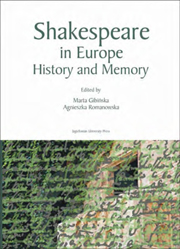Towards a European History of Henry V
Published online by Cambridge University Press: 05 September 2014
Summary
European Shakespeare: Fifteen Years On
For some time now, “European Shakespeare” has been a wingèd phrase, and the regular sequence of conferences devoted to this topic for over a decade now, testifies to the energy that the concept continues to inspire. A number of years ago, it was decided not to channel the “European Shakespeare” enthusiasm via a formal or bureaucratic society with legal status. It was decided that we would be organising conferences every two years if we felt the inspiration and the need to come together, and to publish our work together. And if the incentive was to be no longer felt by us, this would automatically mean the natural end of “European Shakespeare.” There would be no need or duty to keep it alive by artificial means. Hence, one is glad to note that the 2005 Krakow conference, with so many participants from all over the world, is still the best evidence of continuing if not growing enthusiasm for “European Shakespeare.”
“European Shakespeare” was originally hailed with enthusiastic praise, and many will remember Peter Holland's words of support when he stressed the relevance of analyzing the rich and unique variety of Shakespearean appropriations available on the continent, of analyzing “the rich cultures in which Shakespeare speaks, in which, indeed, he is the uniquely necessary voice, often speaking with many times the eloquence he currently attains in English.” In the course of the 1990s, encyclopedias, conference programs, and even publishers' series have started to cast their nets ever wider to do justice to the phenomenon. “European Shakespeare,” it seems, has become a federal force to reckon with.
- Type
- Chapter
- Information
- Shakespeare in EuropeHistory and Memory, pp. 9 - 32Publisher: Jagiellonian University PressPrint publication year: 2008

